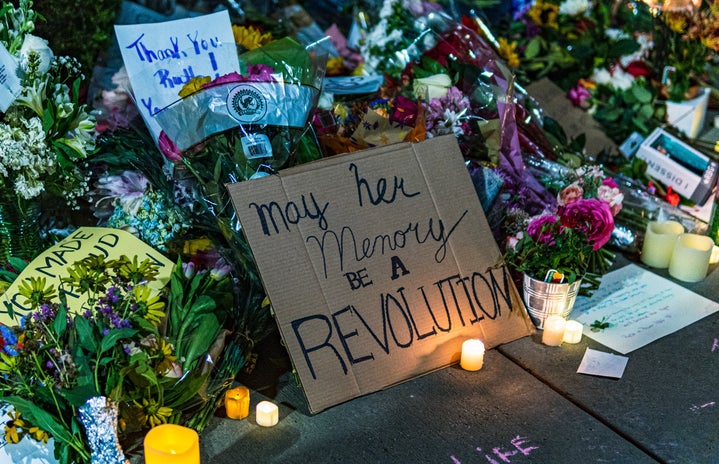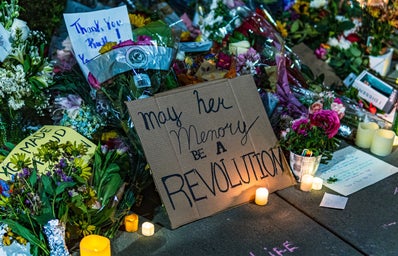The death of Justice Ruth Bader Ginsburg has left millions of women in mourning, not only for the feminist icon she was, but for what’s to come leading up to the Nov. 3 election.
Ginsburg was a pioneer of women’s equality, voting to protect the right to abortions and contraceptive access, in addition to upholding anti-discrimination laws. She used every trick in the book to do it, including using male plaintiffs in the fight for gender equality, and was known for her creative and compelling arguments while she served as an attorney — even more so when she served on the other side of the bench. RBG’s reputation as a progressive judge feels impactful and devastating, because with her passing comes an empty court seat and one looming question: what is the future of reproductive rights in America?
The history of Roe v. Wade
The Supreme Court legalized abortion in 1973, ruling in favor of Roe in Roe v. Wade. Since that time, the country has been divided in its support for a woman’s right to choose an abortion, which is protected by the 14th amendment. In years following, many states have imposed restrictions on abortion rights.
Ginsburg’s argument when she spoke on issues mirroring Roe v. Wade accentuated a woman’s autonomy of her body, rather than the issue of abortion itself. This was a consistent theme throughout her career: a person’s body is their own. “This is something central to a woman’s life, to her dignity,” she said about abortion during her 1993 confirmation hearing. “It’s a decision that she must make for herself. And when the government controls that decision for her, she’s being treated as less than a fully adult human responsible for her own choices.”
As such, RBG’s vote was crucial in blocking a repeal of Roe v. Wade. Now, our leaders have the ability to confirm a conservative justice of President Trump’s choosing in Ginsburg’s vacant seat, one who could criminalize abortion and put reproductive rights at risk.

Mitch McConnell is leading the charge to fill RBG’s seat
Currently, Senate Majority Leader Mitch McConnell is leading the mission to nominate and appoint a new justice before Nov. 3, disregarding Ginsburg’s last wish not to be replaced until after the election. McConnell allegedly has enough support to attempt to fill the vacant seat before a new president is chosen, which while not unconstitutional, is still unprecedented. This comes after a similar situation in 2016, where the late Justice Scalia’s passing left a vacant seat on the court under the Obama administration. Republicans urged the administration to wait to fill the role, leaving it to both “the people and the next President.”
While the country now finds itself in an identical position, McConnell has chosen a route different than the one he had advised to Obama, namely because of the benefits that appointing a conservative justice would bring to his party.
President Trump is adamant that someone will be appointed before Election Day
Over the weekend, President Trump announced that he would choose a female SCOTUS nominee. Judge Amy Coney Barrett, a judge on the Chicago-based U.S. Court of Appeals for the 7th Circuit, is a front-runner on the list of candidates under consideration. Trump first nominated Barrett in May 2017, and she is a clear choice for McConnell due to her strong family values and Catholic background.
While the possibility of another female justice is likely, Barrett’s voting record starkly opposes Ginsburg’s and the appointment of another conservative judge would only hinder the progress of gender equality that many are fighting to maintain. Barrett has remained tight lipped on several issues, including her stance on Roe v. Wade, which is promising to conservative leaders. Her loyal backing by the Trump administration does not indicate that she would uphold the current ruling.
The thought of an additional female Supreme Court justice is welcomed by many of Americans nationwide. However, “ramming through” a potential nominee prior to the election in hopes of a 6-to-3 conservative majority on the nation’s highest court puts women at risk. Justices like Brett Kavanaugh and Neil Gorsuch are known for their restrictive approaches to women’s rights issues, and there is no way of telling how many rulings will be impacted by this new majority.
Many voters are contacting their representatives to indicate whether they would like RBG’s seat to be filled before or after a new president is elected. Read here for more information on how to contact your representative.



